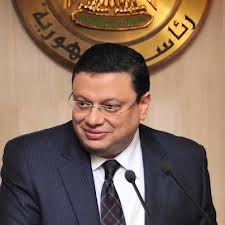The Palestinian-Israeli conflict has topped President Abdel Fattah Al-Sisi’s agenda throughout the UN general assembly in New York, where he gave speeches and interviews and held bilateral meetings.
In his interview with renowned journalist Charlie Rose on PBS, Al-Sisi said that when he tackles the Palestinian-Israeli conflict, he won’t only be addressing Israeli prime minister Benjamin Netenyahu, but also the public opinion in Israel. Al-Sisi added that the Israeli public should be aware of the importance of achieving peace as it will change the policy of the Middle East and will lead to substantial change in the region.
Al-Sisi went on to say that peace will lead to stability and security in the region. He addressed Israeli citizens, saying that such a sensitive issue cannot be tackled solely through the prime minister or the government.
The president further continued that there is a difference between imposing a solution and convincing people of the importance of reaching a solution, and that the latter option will be more effective. He concluded by saying that the Palestinian conflict is one of the key reasons behind terrorism in the Middle East region.
Political analyst at Ahram Centre for Strategic Studies, Abdel Aleem Mohamed, told Daily News Egypt that Al-Sisi has given sufficient attention to the Palestinian-Israeli conflict and made statements regarding reviving peace talks together with France. Israel has continued its violations and the dissociation of Arab countries is assisting in enhancing Israel’s position.
Mohamed added that Arab countries are deeply invested in their internal affairs, and Egypt is the only country in a position to suggest initiatives—it is a current member of the UN security council and has a strong diplomatic position to be able to have its say in the conflict.
Mohamed said: “There’s an obvious split in the Palestinian side; the Palestinian position must be rebuilt to be strong and solid. Also, Israel is continuing its violations and its expansion in settlements regardless of the suggested initiatives. There should be pressure on Israel to stop these violations because it has no other solution but to get back to negotiations.”
Among the many times that Al-Sisi addressed the conflict in an attempt to reach a solution to the dispute, in his speech before the UN general assembly he called on Israel to adhere to the Egyptian initiative of implementing the 2002 Arab Peace Initiative. This call was not included in the president’s official speech, rather he diverted from his original speech to add this part.
Egypt has been adopting a smooth stance towards Israel. In an interview with Al-Monitor, Foreign Minister Sameh Shoukry said that Egyptian-Israeli relations are strong and stable. In his latest visit to Israel, Shoukry received a harsh backlash as his visit was described as “normalising relations” with Israel. The visit included extensive discussions with Netanyahu to revive the peace talks.
Meanwhile, during the 33rd regular session of the UN Human Rights Council, held in Geneva, Egypt’s UN permanent representative Amr Ramadan discussed the human rights situation in occupied Palestine.
Ramadan’s statement to the council pointed out the violations against Palestinian citizens, arbitrary arrests, and severe violations that include imposing restrictions on freedoms of Palestinian citizens. Ramadan called on the council to take responsibility towards the Israeli violations and try to restrict them.
The violations that were mentioned by Ramadan have not been touched upon by Al-Sisi in any of his talks or initiatives. He focused on addressing Israeli public opinion to revive the peace talks with Palestinians.
Conversely, Netanyahu slammed the condemnations Israel constantly receives from the UN in his speech before the general assembly. He called the UN Human Rights Council a “joke” and said that Israel will not accept any attempts from the UN to dictate its terms. Though Netanyahu has invited Palestinian president Mahmoud Abbas to speak to the Israeli people before the Knesset, he specified that he should refrain from a stance of hatred—an obvious sign of rejection to external intervention in the peace talks.



